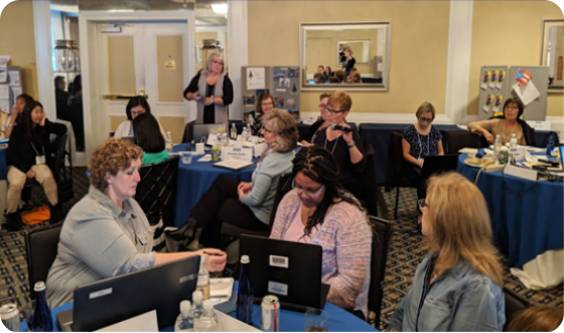
Pre-service is the term used to describe the education and training that occurs prior to a practitioner obtaining a college degree and entering the workforce. Pre-service prepares individuals to meet the personnel standards of a specific discipline.
Institute of Higher Education (IHE) programs of study provide training for individuals to acquire the specified knowledge, skills, and competencies required to meet state and national personnel standards in a specific discipline. The programs of study also include sufficient field-based experiences across a variety of high-quality infant and early childhood settings.
For more information: CSPD Pre-Service Training
- Provide guidance to IHE programs and confirm curricula for each discipline are based on knowledge and skill competencies that are aligned with state personnel standards.
- Ensure that the IHE programs and curricula for each discipline are based on knowledge and skill competencies that are aligned with national professional organization personnel standards.
- Assist IHE programs and curricula for each discipline are aligned with state and local program quality initiatives and evaluation systems (e.g., QRIS, educator effectiveness frameworks, licensing).
Link to State CSPD Page
The ECPC collaborated with the Early Childhood Technical Assistant Center (ECTA) to create an Early Childhood Systems Framework for Part C and section B(619) Coordinators to evaluate their current systems, identify potential areas for improvement, and develop more effective and efficient systems that support the implementation of evidence-based practices in each of six main areas. The ECPC’s work resides in the Personnel/Workforce (PN) component of this framework, which addresses the necessity of understanding workforce capacity in order to provide timely and consistent services by prepared personnel in early childhood. ECPC-CSPD Self-Assessment
CSPD State Work on Pre-Service
Resources
The Initial Practice-Based Standards for Early Interventionists/Early Childhood Special Educators (EI/ECSE) standards represent the first Standards to focus specifically on the preparation of early interventionists and early childhood special educators who work with young children ages birth through eight who have or are at-risk for developmental delays and disabilities and their families, across home, classroom and community settings.
Cross-Disciplinary Competencies
Representatives from each of the seven professional organizations reviewed the competency areas and sub-areas and presented these core competency areas for approval to each of their respective organizations. American Occupational Therapy Association (AOTA); the American Physical Therapy Association (APTA); the American Speech-Language-Hearing Association (ASHA); the Council of Exceptional Children (CEC) and the Division of Early Childhood (DEC), the National Association for the Education of Young Children (NAEYC); and ZERO TO THREE.
Pre-Service Briefs
Crosswalks of the EI/ECSE standards
Crosswalk of the Initial Practice-Based Professional Preparation Standards EI/ECSE with DEC RPs
Crosswalk of the Initial Practice-Based Professional Preparation Standards Early Interventionists/Early Childhood Special Educators (2020) with the DEC Recommended Practices (2014)
Crosswalk EI/ECSE and ECE Standards
Crosswalk of the Initial Practice-Based Professional Preparation Standards Early Interventionists/Early Childhood Special Educators (2020) with the Early Childhood Educators Standards (NAEYC)
Crosswalk Tools
The intended use of the ECPC Curriculum Planning Tool is to provide higher education faculty with a tool to develop initial Early Intervention/Early Childhood Special Education (EI/ECSE) programs and blended Early Childhood Education (ECE) and ECSE programs aligned with personnel preparation standards and recommended practices and to ensure that the standards and recommended practices are embedded within and throughout the curriculum. The development of the ECPC curriculum planning tool was driven by the EI/ECSE Practice-based Professional Preparation Standards aligned with the DEC Recommended Practices (RPs) (2014). You will find each EI/ECSE Standard as a separate tab on the tool. This is a downloadable excel file and should be personalized to meet the needs of your EI/ECSE or blended ECE/ECSE program. The tabs represent Standards in early childhood special education and are not intended to represent single courses within an EI/ECSE program.
ECPC Curriculum Planning Tool including IMH ZTT
Enhanced Curriculum Planning Tool version that includes alignment of the EI/ECSE Standards, ECE Competencies, DEC Recommended Practices, ECPC Cross-Disciplinary Competencies/Indicators, Infant and Early Childhood Mental Health Consultation Competencies (IECMHC), Zero To Three Competencies.
Quality Indicators
Quality Indicator 5: IHE programs and curricula across disciplines are aligned with both national professional organization personnel standards and state personnel standards.
-
- IHE programs and curricula for each discipline are based on knowledge and skill competencies that are aligned with state personnel standards.
- IHE programs and curricula for each discipline are based on knowledge and skill competencies that are aligned with professional organization personnel standards.
- IHE program competencies are operationalized and defined by example.
- IHE programs and curricula for each discipline are aligned with state and local program quality initiatives and evaluation systems (e.g., QRIS, educator effectiveness frameworks, licensing).
- IHE programs and curricula for each discipline are coordinated to ensure an adequate number of programs of study are available to meet current and future personnel needs.
Quality Indicator 6: IHE programs and curricula address early childhood development and discipline specific pedagogy.
-
- IHE programs and curricula across disciplines recruit and prepare personnel for professional roles and responsibilities.
- IHE programs and curricula across disciplines contain evidence-based practices that reflect the learning needs of children with and at-risk for developmental delays and disabilities and their families.
- IHE programs and curricula provide relevant field experiences such as internships, observations, and practicums in a variety of inclusive early childhood settings.
- IHE programs and curricula are reviewed, evaluated, and updated to reflect current intervention evidence and revised state personnel standards and national professional organization personnel standards.
- IHE programs of study and curricula utilize evidence-based professional development practices and instructional methods to teach and supervise adult learners.
- IHE faculty collaborate and plan with in-service providers to align pre-service and in-service personnel development so there is a continuum in the acquisition of content from knowledge to mastery.